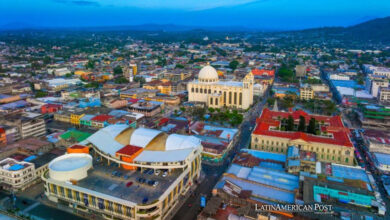Why Is Nayib Bukele so Popular in Latin America?
The president of El Salvador, Nayib Bukele, is the president with the highest favorability in the entire region and his way of governing could redefine the right in Latin America.

Photo: El Salvador Presidency
LatinAmerican Post | Santiago Gómez Hernández
Listen to this article
Leer en español: ¿Por qué Nayib Bukele es tan popular en Latinoamérica?
For several months now, the popularity of Nayib Bukele has crossed the borders of El Salvador. He is, without a doubt, the president with the greatest favorability, not only in his country, but in the entire region. In times when the loss of institutional legitimacy and citizen trust is a common denominator, not only in the region, but in numerous countries, such a beloved leader is unusual. Bukele has shown that with the way he has governed, he has managed to capture a large heterogeneous mass within his country.
This is not only demonstrated in presidential elections. Bukele has been able to create a solid political movement and a majority in the legislature. In the last elections, the president's party, Nuevas Ideas, won 56 seats out of 84 in the Assembly. But it is not only that, the entire official coalition adds up to 64 assembly members. The opposition barely manages to add 20, including the 11 positions of ARENA and 4 of the FMLN that were previously the 2 traditional parties.
Exploit the Mistrust of Traditional Parties
Nayib Bukele, like many other politicians in Latin America, also understood the serious crisis of the traditional political parties. If it is true that the conditions of extreme poverty have improved throughout the region, compared to previous decades, the particular decline in certain areas, the corruption scandals, the increase in inequality and the slow social mobility have frustrated the majority of the citizens. This not only happens in El Salvador, but in the world in general. This is why, every day, new political parties are shown as great options when choosing politicians. This was achieved by Bukele with his Nuevas Ideas party.
An Independent Speech, Distanced from Right and Left
Despite the fact that Nayib Bukele was previously mayor for the left-wing Farabundo Martí National Liberation Front party, when he became president he presented himself as an independent. His speech tried to get out of the dichotomy of right and left (like many politicians), and target the great mass of Salvadorans who were looking for quick and effective solutions to their problems.
Not only because of his new party, but because of his very speech, he comes from a center-left base, like his FMLN party, but has been turning to the right. He tries to talk about inequality and aid policies, but with his own values or those adopted by right-wing groups. His form of government could be assimilated to that of the contemporary right-wing leader in Colombia: Álvaro Uribe. The Colombian has always made security policies his greatest achievements, but without ignoring subsidy policies. This, despite denunciations of serious human rights violations of his popular “Democratic Security” policy (leaving cases of extrajudicial executions by the Armed Forces of thousands of Colombians).
Alert to Progressivism
Without a doubt, Bukele's most controversial policy, but also the most striking for a certain group of people, is the security policy. The Salvadoran government declared a frontal war against the criminal gangs known as maras.
Read also: Security and Violence in Colombia: the State's Inability to Protect its Politicians
Since the beginning of the emergency regime, the country's security apparatus has launched a campaign to capture all possible suspects of participating in these criminal groups. This is accompanied by the construction of a mega prison and with images of all the prisoners in conditions of submission to justice. As a result, it has generated, on the one hand, the applause of many who see in the strong hand of Nayib Bukele a quick solution to crime problems. But it has also been the target of criticism from human rights groups and progressive groups. For this group, the two main concerns are the possible capture of innocents and the possible conditions that break the prisoners' humanitarian pacts.
Beyond the possible and serious abuses, there is a hidden reality to which progressivism must begin to provide real solutions. In Latin America, crime plagues all socioeconomic classes and ends up being an additional challenge for small businessmen, workers, families, etc. Security can be a decisive factor for the economies of families. Without security, the population of several Latin American countries see authoritarian figures, and who can end up in dictatorial governments, as the only saviors. Without ignoring the multidimensional origins of violence and crime (such as inequality, lack of education, employment, opportunities, and circles of violence), the current Democratic leaders must begin to offer real solutions before the phenomenon of bukelismo continues to spread on the continent.
The Redefinition of the Latin American Right
The leader of Nuevas Ideas has not only had a transcendence in political ideals. His unorthodox methods and proposals have transcended the borders of El Salvador. Today, politicians like Payo Cubas in Paraguay or Rodolfo Hernández in Colombia show that the Salvadoran seems to be predefining the Latin American right. The political capital that a popular leader can generate, whose flag is security and economic freedom, but without ignoring the inequality of its citizens, is an oasis for the Latin American right. As of May 2023, only Ecuador, Paraguay, El Salvador, and Guatemala (and Peru after the removal of Pedro Castillo) have accounted for victories for the right in the region. After a clear turn to the left, conservative leaders see in Bukele a possible example to seduce voters.





